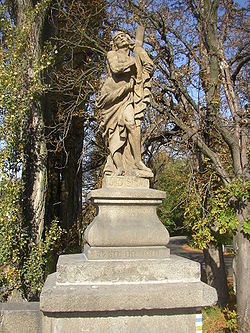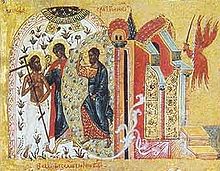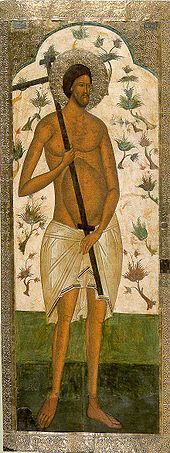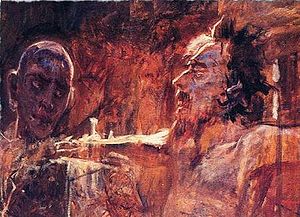- Penitent thief
-
Saint Dismas 
Statue of St Dismas (1750) in Březnice, Czech Republic.The Good Thief Died c. 33 AD
Golgotha Hill outside JerusalemHonored in Eastern Orthodox Church
Catholic ChurchFeast March 25 Attributes Wearing a loincloth either holding his cross or being crucified; sometimes, standing in Paradise Patronage prisoners, especially condemned prisoners; undertakers; repentant thieves; Merizo, Guam, San Dimas, Durango The Penitent thief, also known as the Thief on the Cross or the Good Thief, is an unnamed character mentioned in the Gospel of Luke who was crucified alongside Jesus and asked Jesus to remember him in his kingdom.
In different Christian traditions different names have been given to the thief:
- In the Gospel of Nicodemus and Catholic tradition the name Dismas is given to the thief. He was never canonized by the Catholic Church but is venerated as a saint by local traditions as Saint Dismas (sometimes spelled "Dysmas" or in Spanish "Dimas"). The name Dismas for this thief may date back to the 4th century.
- In Arabic Christian tradition he is named Titus.
- In Codex Colbertinus he is named Zoatham.
- In Russian Orthodox tradition he is named Rach.
Contents
Gospel of Luke
The narrative
Two men were crucified at the same time as Jesus, one on his right hand and one on his left (Matthew 27:38, Mark 15:27-28, Luke 23:33, John 19:18), which Mark interprets as fulfillment of the prophecy of Isaiah 53:12. According to Matthew, both of the "thieves" mocked Jesus (Matthew 27:44); Luke however, mentions that
39 Now one of the criminals hanging there reviled Jesus, saying, "Are you not the Messiah? Save yourself and us." 40 The other, however, rebuking him, said in reply, "Have you no fear of God, for you are subject to the same condemnation? 41 And indeed, we have been condemned justly, for the sentence we received corresponds to our crimes, but this man has done nothing criminal." 42 Then he said, "Jesus, remember me when you come into your kingdom." 43 He replied to him, "Amen, I say to you, today you will be with me in Paradise." 23:39-43
Today... in paradise
The phrase translated "today... in paradise" in Luke 23:43 is disputed in a minority of versions and commentaries. The Greek manuscripts are without punctuation, so attribution of the adverb "today" to the verb "be", as "be in paradise today" (the majority view), or the verb "say", as "today I say" (the minority view), is dependent on analysis of word order conventions in Koine Greek. The majority of ancient Bible translations also follow the majority view, with only the Aramaic Curetonian Gospels offering significant testimony to the minority view.[1]
Saint Thomas Aquinas: "The words of The Lord (This day....in paradise) must therefore be understood not of an earthly or corporeal paradise, but of that spiritual paradise in which all may be, said to be, who are in the enjoyment of the divine glory. Hence to place, the thief went up with Christ to heaven, that he might be with Christ, as it was said to him: "Thou shalt be with Me in Paradise"; but as to reward, he was in Paradise, for he there tasted and enjoyed the divinity of Christ, together with the other saints."[2][3][4]
Christian traditions
Unnamed
Augustine of Hippo does not name the thief, but wonders if he might not have been baptized at some point.[5]
According to tradition, the Good Thief was crucified to Jesus' right hand and the other thief was crucified to his left. For this reason, depictions of the crucifixion often show Jesus' head inclined to his right, showing his acceptance of the Good Thief. In the Russian Orthodox Church, both crucifixes and crosses are usually made with three bars: the top one, representing the titulus (the inscription that Pontius Pilate wrote and was nailed above Jesus' head); the longer crossbar on which Jesus' hands were nailed; and a slanted bar at the bottom representing the footrest to which Jesus' feet were nailed. The footrest is slanted, pointing up towards the Good Thief, and pointing down towards the other.
According to St. John Chrysostom, the thief dwelt in the desert and robbed or murdered anyone unlucky enough to cross his path. According to Pope Saint Gregory the Great he "was guilty of blood, even his brother's blood; (fratricide)".[2][3][4]
The name Dismas
Only the Gospel of Luke describes one of the thieves as penitent, and even that gospel doesn't name him. Luke's unnamed penitent thief was later assigned the name Dismas in the Gospel of Nicodemus, portions of which may be dated to the 4th century. The name "Dismas" was adapted from a Greek word meaning "sunset" or "death."[6] The other thief's name is given as Gestas. In Jean Joseph Gaume's Life of the Good Thief (Histoire Du Bon Larron French 1868, English 1882), Saint Augustine said; the thief said to Jesus, the child: " O most blessed of children, if ever a time should come when I shall crave Thy Mercy, remember me and forget not what has passed this day."[2][3][4] Blessed Anne Catherine Emmerich saw the Holy Family "exhausted and helpless"; according to St. Augustine and St. Peter Damian, the Holy Family met Dismas, in these circumstances.[7]
The apocryphal Arabic Infancy Gospel calls the two thieves Titus and Dumachus, and adds a tale about how Titus (the good one) prevented the other thieves in his company from robbing Mary and Joseph during their Flight into Egypt.
In the Russian tradition the Good Thief's name is "Rakh" (Russian: Рах).
Patriarch Theophilus of Alexandria (385–412) wrote a Homily on the Crucifixion and the Good Thief, which is a classic of Coptic literature.
Canonization
The Catholic Church never formally canonized Saint Dismas, though he is regarded as a saint by virtue of Jesus saying he would be in Paradise, and by local church traditions. The feast of St. Dismas is on the 25th of March, shared with the feast of The Annunciation of the Blessed Virgin Mary.
A number of towns, including San Dimas, California, are named after him. There also exist parish churches named after him, such as the Church of the Good Thief in Kingston, Ontario, Canada -- built by convicts at Kingston Penitentiary, Saint Dismas Church in Waukegan, Illinois and the Church of St. Dismas, the Good Thief a Roman Catholic church at the Clinton Correctional Facility in Dannemora, New York.
Art
 Icon showing Christ (center) bringing Dismas (left) into Paradise. At the right are the Gates of Paradise, guarded by a seraph (Solovetsky Monastery, 17th century).
Icon showing Christ (center) bringing Dismas (left) into Paradise. At the right are the Gates of Paradise, guarded by a seraph (Solovetsky Monastery, 17th century).
In medieval art, St Dismas is often depicted as accompanying Jesus in the Harrowing of Hell as related in 1 Peter 3:19–20 and the Apostles' Creed (though neither text mentions the thief).
In the Eastern Orthodox Church, one of the hymns of Good Friday is entitled, The Good Thief (or The Wise Thief, Church Slavonic: Razboinika blagorazumnago), and speaks of how Christ granted Dismas Paradise.[8] There are several compositions of this hymn[9] which are used in the Russian Orthodox Church and form one of the highlights of the Matins service on Good Friday.
Popular culture
As part of Christ's story the good thief often appears in cinematic portrayals though with varying degrees of importance. He sometimes appears as just a background character whose presence in the film is limited to his role in the Gospel of Luke, if that much. One exception was Cecil B. Demille's 1927 film The King of Kings where his fate is compared to Jesus'. While in one scene people are mourning for Jesus as He is en route to Golgotha, in the next scene the very same people are throwing garbage at the two thieves. Later, when all three men are crucified, the good thief defends Jesus from Gestas' insults and asks to be forgiven for his own crimes. Jesus forgives the good thief. Later when the two men are dead, Mary is mourning at the foot of her Son's cross. She notices that at the foot of the thief's cross is a disheveled old woman crying for him. The old woman says "He was my son." The two mothers embrace and console each other.
In the 1961 film King of Kings, the two thieves, along with Barabbas, are awaiting their fates. The two thieves are appalled when Barabbas compares himself to them. They say "We're only thieves! You're a murderer!"
Third Day's 1995 song "Thief" is presented from the perspective of the good thief, as is Sydney Carter's controversial song "Friday Morning".[10] and the Christian rock band Dizmas named themselves after the "good thief" in recognition of his decision on the Cross to follow Christ.
See also
- Gestas, the other thief on the cross
- Passion (Christianity)
- List of names for the Biblical nameless
References
- ^ Bruce Metzger A Textual Commentary on the Greek New Testament United Bible Societies 2nd Ed. 1994
- ^ a b c The Life of The Good Thief, Msgr. Gaume, Loreto Publications, 1868 2003.
- ^ a b c Catholic Family News, April 2006.
- ^ a b c Christian Order, April 2007.
- ^ Stanley E. Porter, Anthony R. Cross Dimensions of baptism: biblical and theological studies 2002 Page 264 "It is interesting to notice, in this connection, that in his Retractions, Augustine wondered whether the thief might not in fact have been baptized at some earlier point (2.18)."
- ^ Lawrence Cunningham A brief history of saints Page 32 2005
- ^ The Life of the Blessed Virgin Mary, from the Visions of Ven. Anne Catherine Emmerich, TAN Books, 1970.(No.2229)/(No.0107).
- ^ The text of the hymn (translated into English): "The Wise Thief didst Thou make worthy of Paradise in a single moment, O Lord. By the wood of thy Cross illumine me as well, and save me"
- ^ One of the most notable versions of the hymn is Pavel Chesnokov's Razboinika blagorazumnago (The Wise Thief)
- ^ Sydney Carter, obituary Daily Telegraph, March 16, 2004
External links
- Patron Saints: Dismas
- The Wise Thief hymn from Eastern Orthodox Good Friday service (in English)
- Saint Dismas - Freebase
Categories:- 1st-century Christian saints
- 30s deaths
- Christian folklore
- Eastern Orthodox saints
- New Testament people
- People executed by crucifixion
- People executed for theft
- Saints from the Holy Land
- Gospel of Luke
Wikimedia Foundation. 2010.


